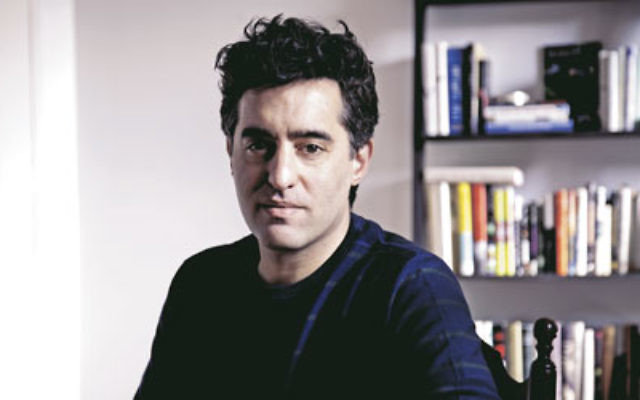Stories of life and Anne Frank
IT’S tropical Florida and two Jewish couples – one Orthodox and one secular – look about furtively. They are stoned, but the tense atmosphere is not a result of their smoking, but of a perverse game based on the question: Who, of all the gentiles inhabiting their neighbourhood, would risk their lives to save them, if the Nazis come through the door?
It’s an intriguing thought and not just the business of fiction. When other children were playing with yo-yos, New York author Nathan Englander, 41, was playing the “Anne Frank game” with his sister.
“We would hide and I would think: ‘She’s right, that guy would hide us and that guy would turn us down. It was when I started working on these stories that I was able to look at that moment and say: ‘This is really pathological’,” says Englander in an interview with The AJN.
Englander has drawn on the “Anne Frank game” for his provocative writing in his latest book, a collection of eight short stories titled What We Talk About When We Talk About Anne Frank.
Another story in the book, Sister Hills, is a political fable, chronicling the history of Israel’s settlements from the eve of the Yom Kippur War to the present. In what could be mistaken for a biblical parable, the story tells the tale of two mothers who strike a terrible bargain to save a child.
This book follows his early collection of short stories, For the Relief Of Unbearable Urges, the novel The Ministry of Special Cases, a play based on a short story titled The Twenty-Seventh Man, which is due to be staged later this year, and a collaboration with close friend Jonathan Safran Foer in translating from Hebrew to English The New American Haggadah.
Englander has also translated a number of Etgar Keret’s short stories and toured with him since the release of Keret’s collection, Suddenly, a Knock on the Door.
Some stories in What We Talk About When We Talk About Anne Frank date back a few years, but the compilation took Englander only a year – in stark contrast to the decade he devoted to The Ministry of Special Cases while living in Israel.
“I returned to that feeling in writing these stories, of being alone in my room and saying: ‘This is what I’m going to do no matter what and at whatever cost. If I can find a way to feed myself, that’s good. I just need to write this story’.”
If Woody Allen and Phillip Roth gave us the language for neurosis, or the beet-faced comedy of sexual frustration, Englander, in writing about the “Anne Frank game”, provides a paradigm for the unspeakable – the imaginative landscape of a people stricken by the Holocaust or centuries of persecution.
Yet according to Englander the writer’s intentions – may they be religious or political – are secondary to the story’s achievement.
“The story only gets written when I fall away. It doesn’t happen when I’m being Nathan or being in a room writing and composing. It’s sort of intellectual, but really primal and emotional.”
The collection is ticklish in its playfulness, while meditating, unflinchingly, on questions of identity, piety and loyalty. Such themes, courageous in their moral tenor, come with little surprise, considering the author’s history.
After 20 years of an Orthodox Jewish upbringing in Long Island, New York, Englander flew to Israel with a college friend. He realised that religious adherence had little to do with being a culturally rich Jew. Eventually, he dropped the religious regimen and jumped on a bus on Shabbat.
“It was like being in this closed Orthodox world, in this complete universe, and you’re told: ‘This is your life and here are the acceptable jobs and this is the one you’re going to get married to’,” he says. “People talk about having choice – there’s no choice in this kind of life … and I felt that I had to question it.”
The implications of his life decision took the drama of his first collation of stories, and shades of these themes resurface and embolden.
In the story Peep Show, Allen, a secular husband and father-to-be, tentatively wanders into a peep show of flashing perfections. A knock to his head sends him spiraling down a phantasmagoria and he fronts the ghosts of his past. Rabbis of his childhood, naked, are goading him for answers. “You should have questioned … that is what intelligent people do. They don’t throw their religion away.”
It wasn’t long after the story was published in the New Yorker 13 years ago that a Chassidic parliamentary member in Israel, approached by a rabbi in Brooklyn, contacted Englander to have some words.
The past, if not haunting him, or his characters, appears to be hunting him down.
“I try to suffer less from unnecessary guilt. The idea of putting that stuff away is probably the form the collection takes.”
Englander’s language, which is peppered with biblical citations and slips into the theological or abstract, makes it hard to fight his claim: “If the rabbis had dealt with me properly, I would have had a beard down to the floor today.”
Despite boasting a jacket cover punctuated with puff quotes from the likes of Franzen, McCann, Eggers and Foer, Englander takes little for granted.
“It’s amazing that you can write something down and share an experience. And it’s shared because I’m not just a writer, I’m a reader.”
Nathan Englander’s collection of short stories, What We Talk About When We Talk About Anne Frank, is published by Random House, $24.99 (rrp).
REPORT by Timna Jacks
PHOTO of Nathan Englander


comments